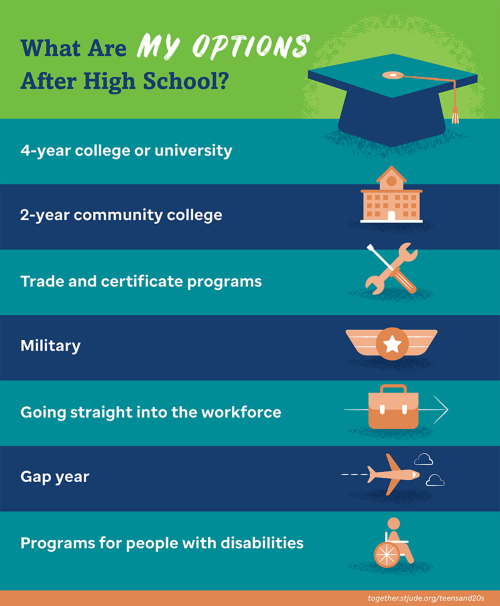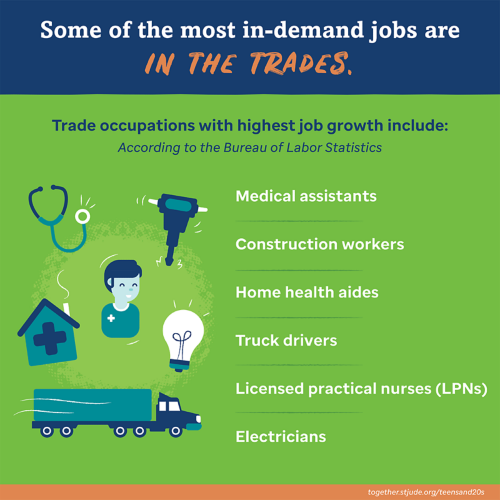Graduating from high school is a huge milestone.
You’ve gone through 12 years of school to get to this moment. The question is: now what?
Graduating from high school is a huge milestone.
You’ve gone through 12 years of school to get to this moment. The question is: now what?

Graduating from high school is a huge milestone. You’ve gone through 12 years of school to get to this moment. The question is: now what?
One major goal may be finding a career.
More than one path can get you there. The key is to figure out what you want to do and make a road map to reach your destination.
Most jobs require at least a high school diploma. Other jobs require some education or training after high school. You may need an associate’s, bachelor’s, master’s, or more advanced degree for some careers.
Need some guidance? You can talk to people who specialize in helping high school students make choices about career training. These professionals may include:
They can use assessment tools such as personality tests to identify your strengths and weaknesses and interest inventories to find out your likes and dislikes. Other evaluations can look at your work values, skills, and abilities.
Counselors can help you research the requirements for different career paths and job outlooks.
They can also advise you on the impact childhood cancer and its treatment may or may not have on your long-term health and your ability to do certain jobs.
This information can give you an idea of possible career opportunities. Your counselor can help you plan how to get the necessary education and training.

Post high school options include:
A traditional 4-year college or university is an undergraduate degree program that leads to a bachelor’s degree in a specific area of study. Students complete a bachelor’s degree to prepare for a profession after college, enter a graduate program, or both.
To qualify for admission to a four-year college of university, you must have a high school diploma or GED and take the ACT or SAT college placement test.
Two-year colleges are known as community colleges. They offer a degree program called an associate degree. This degree either prepares you for a career after graduation or to transfer to a bachelor’s degree program.
You are eligible to attend a community college if you have a high school diploma or earned a GED. You can transfer to a four-year college to earn a bachelor’s degree. Tuition is usually less expensive at community college than 4-year schools.
Financial aid and scholarships are available for cancer patients and survivors.
College Navigator from the National Center for Education Statistics and College Scorecard from the U.S. Department of Education are two general resources for information about 2-year and 4-year colleges.
A trade school is sometimes called vocational school or technical school. It trains students in technical skills to prepare for certain jobs. When you graduate, you receive a diploma or certificate confirming that you completed the program.
Examples of occupations include dental hygienist, computer technician, respiratory therapist, electrician, plumber, mechanic, chef, and cosmetologist.
Some of the most in-demand jobs are in the trades. According to the Bureau of Labor Statistics, trade occupations with highest job growth include:
For more information, visit the Federal Trade Commission’s Choosing a Vocational School resource.

The U.S. Military may be an option for you. It provides a salary, benefits, job training, and travel. But serving in the military requires you to commit to certain number of years of service.
The military has 5 branches:
Each branch has its own focus and career options. To apply, you must take the Armed Services Vocational Aptitude Battery (ASVAB) test. Each branch requires you to pass a physical examination and meet certain weight requirements. Fitness requirements vary depending on the branch.
For more information, visit Join the Military.
There are several jobs available for high school graduates that pay good salaries. Many of these job require an apprenticeship. An apprenticeship is a period when a new worker is paid while training under with an experienced, skilled worker.
For more information about jobs that don’t require a college degree, visit the Bureau of Labor Statistics Career Outlook page.
A gap year is a period that people use to explore areas of interest and earn money before starting college or a career. People who take a gap year often use the time to work, volunteer, travel or a combination of these options.
There are several types of gap year programs. Some are paid opportunities. Some offer free housing and food in return for volunteer work.
These may include:
One volunteer and service program is AmeriCorps. It is a network of national service programs funded by a federal agency, the Corporation for National Community Services, along with non-profit organizations and corporations.
For more information, visit the Gap Year Association.
Job Corps is a free federal program for people ages 16-24 who meet certain requirements, including having a low income. Students can earn a high school diploma or equivalent and college credits. Job Corps sites are located throughout the U.S. Many provide tuition-free housing, meals, basic health care, a living allowance, and career transition assistance.
Career areas include finance and business, health care, construction, information technology, homeland security, and hospitality. Job Corps graduates either enter the workforce or an apprenticeship, go on to higher education, or join the military.
Some childhood cancers and treatments can result in emotional and physical limitations. Those limitations may affect a survivor’s job possibilities – from the choice of career to the hours worked.
Survivors may need additional training and vocational rehabilitation services to complete their education or to find or keep steady employment.
For general information on career choices, visit the U.S. Department of Labor’s My Next Move.
Cancer and Careers has many services and resources to help in your career search.
—
Reviewed: August 2020